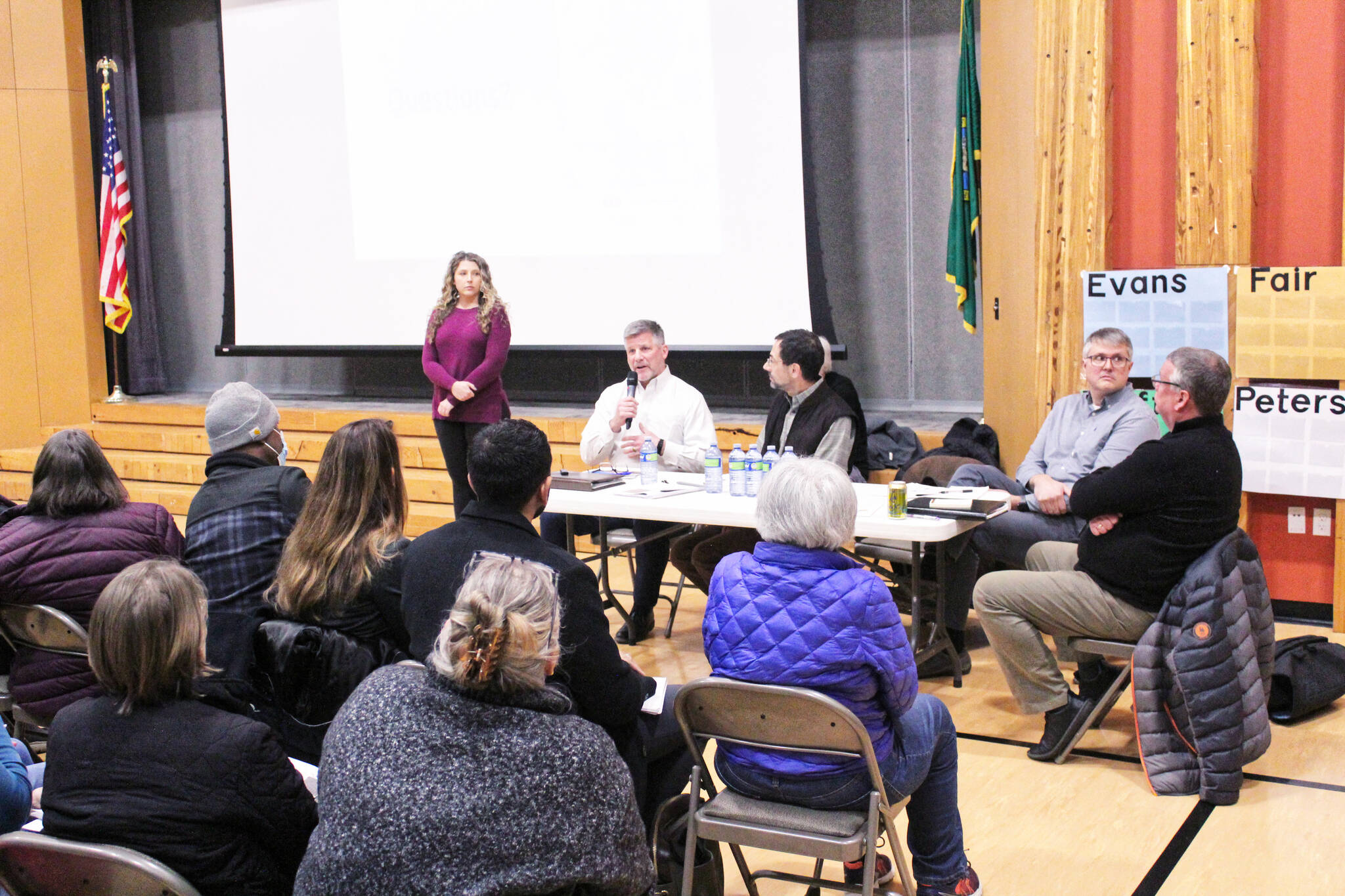The resistance movement against a proposed gravel mine is growing.
For those not familiar with the issue, Segale Properties, LLC is looking to open up a 990 acre gravel mine north of Cumberland and bordering both a state park, King County open space, and Department of Natural Resources land. The contentious proposal led to a heated public meeting on Feb. 27, where residents voiced their concerns about the project.
In short, opponents are worried that the mine will severely impact the natural environment — which includes the forest in the area, the Green River, and access to the DNR property, which local use for recreational purposes — and the rural area’s quality of life when it comes to the additional traffic and noise, if the mine is allowed to operate.
However, Segale representatives have said their mitigation strategies will not affect the local environment. For example, any water runoff from the mine would be collected on non-porous surfaces and recycled or filtered in stormwater ponds. Additionally, the company does not plan to clear-cut and mine the entire area at once, but specific sections at a time, which would limit noise, water runoff, and allow the replanting of the forest to happen quicker.
Clearly unconvinced, some people have formed the Ribbon of Wilderness grassroots organization as a centralized hub for information and resistance against the project.
Ribbon of Wilderness also started a Change.org petition against the mine, which, as of March 18, has gathered almost 700 online signatures. Valerie Cunningham, a member of the group, also said another 250-plus physical signatures have been turned into King County.
Additionally, the city of Enumclaw has joined the fray.
Enumclaw Mayor Jan Molinaro sent a letter to King County on March 8 to oppose the mine; the letter mainly addressed traffic concerns.
“… [Department of Transportation] money is short when repairs are needed so they parcel it out in areas they feel necessary,” he wrote. “In Enumclaw this has not occurred on a much-needed basis over several years.”
Instead of trucks being driven locally, Molinaro asked if King County has considered if the gravel mine’s products could be transported via train to Segale’s Auburn plant, where trucks would be shipped out from. s
“The entire infrastructure in already in place at the Auburn facility,” he continued. “This could reduce emissions from the 600 trips per day out of the new pit, instead having a train haul to the current plant.”
Segale Asset Manager Mike Pruett said in a recent interview that this idea is a nonstarter, at least for his company.
“It’s not feasible. It’s not feasible for multiple, multiple reasons,” he said, listing that Segale would have to extend a railway, convince BNSF to contract with the company to transport the gravel, and that the price of the gravel would be outweighed by the number of times it would have to lifted in and out of train cars and trucks. “… the more you touch stuff that is heavy and inexpensive, the more unfeasible it gets to move around.”
CAN THE COUNTY BUY SEGALE’S PROPERTY?
One of the long-term goals of some opponents of the mine is to convince King County to approach Segale with a deal to buy the company’s land in order to turn it into open space and keep it available for people to use recreationally.
The county’s Land Conservation Initiative already does just that, and has protected 190,000 acres of farmland, forests, trails, urban green spaces, and more since it started in 1970.
According to Stephanie Guzman-Barrera, the deputy public affairs manager with King County’s Department of Natural Resources and Parks, the department “has informally conveyed the county’s interest in potentially acquiring the parcels at issue.”
Pruett has said that no formal offer has been made, and that the “informal approach” consisted of an offhand statement.
“This is after we’ve spent a year and almost $1 million dollars studying the groundwater hydrology. We’re not going to pull the plug on what we’re doing to go pursue that,” he said. “If they’re serious, they’d make an offer.”
WHAT’S WITH THE DNR PROPERTY IN THE MIDDLE OF THE MINE?
The proposed mine, if approved, would surround a 600-acre parcel of land not owned by King County or Segale, but the Washington State Department of Natural Resources, which bought the land from county in 1987, according to the DNR.
DNR currently manages the timber on this land, as per an agreement with King County.
This piece of land has its own interesting history, as King County — or, more specifically, the Municipality of Metropolitan Seattle (Metro) before it merged with the county in 1994 — planned to spray biosolids (or “sewer sludge”) on that parcel.
Biosolids, as defined by the U.S. Environmental Protection Agency, “are a product of the wastewater treatment process” that, when used properly, can be used to add nutrients to soil and promote forestry and timber growth, among other uses.
According to Washington historian Kit Oldham, writer and editor of Historylink.org, the Municipality had “won national recognition” for its biosolid recycling program.
Still, that plan was met with fierce local resistance, and Cumberland resident Cunningham became the lead plaintiff in a lawsuit against the Municipality. The lawsuit, which was bolstered by the ACLU, was not necessarily about the biosolids, but that the Municipality violated the constitutional “one person, one vote” requirement.
The U.S. District Court for the Western District of Washington ruled in September 1990 that the Municipality’s governing structure was unconstitutional, and that a “constitutional restructuring” was in order.
As a solution, Municipality of Metropolitan Seattle merged with King County in 1994, Oldham wrote.
In the meantime, the plan to use biosolids in Cumberland was scrapped, but whether it was because of the merger or for other reasons is unclear at this time.
***


